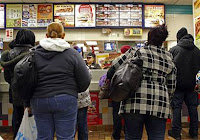 I recently had the question* posed to me, “If there is an easy answer to weight loss, why is our country filled with so many unhealthy, overweight people?” I think this is a fabulous question since the answer certainly uncovers some of the hidden factors behind obesity.
I recently had the question* posed to me, “If there is an easy answer to weight loss, why is our country filled with so many unhealthy, overweight people?” I think this is a fabulous question since the answer certainly uncovers some of the hidden factors behind obesity.
First, obesity is a consequence of an addiction to food. I’m not talking about merely being overweight, here–I mean obesity and, most certainly, severe obesity. Being overweight can be the result of a number of things: eating the wrong foods (eating many meals out, for instance), neglecting exercise, twelve-pack of beer every weekend, and so forth; bad habits, if you will.
 Obesity, however, has an addiction component. Obese people are drawn to food either for sensory pleasures (taste) or emotionally. Emotional eaters eat when they are stressed out, pissed off, hurt, elated, embarrassed, and any other number of emotional stressors that lead one to escape. So food, therefore, is a way for some people to avoid these uncomfortable feelings, whether they are conscious of it or not.
Obesity, however, has an addiction component. Obese people are drawn to food either for sensory pleasures (taste) or emotionally. Emotional eaters eat when they are stressed out, pissed off, hurt, elated, embarrassed, and any other number of emotional stressors that lead one to escape. So food, therefore, is a way for some people to avoid these uncomfortable feelings, whether they are conscious of it or not.
An eating addiction is like any other addiction: a combined enjoyment and escape. Drinkers have it, smokers have it, gamblers have it, and sex addicts have it–it’s a momentary checking out, a retreat from unpleasant feelings, whatever they may be. Often, it’s a totally unconscious act; the addiction becomes habit.
So, as I said in my New Year’s Resolutions article on weight loss, the first step is a true heartfelt desire for change. Some people aren’t inspired to lose weight; they attempt it because of societal pressures. Only true inspiration leads to actions that will endure the pain and pleasures of undertaking a weight-loss endeavor. Anything else will fail when it gets too tough. That’s one reason some people can’t lose weight.
Next, a realistic game plan must be constructed. This is where our topic of The Biggest Loser comes in. A healthy strategy must be implemented and carried out, like any venture, be it business, financial investing, family planning, or weight loss. Without a reasonable or healthy plan, not only is failure likely, but complications can arise.
At the very least, the person losing weight runs the risk of putting it all back on again. This is the part of the strategy that requires The Six Keys To Optimal Health. Without them, the whole endeavor ends up momentary, and it’s exactly why Biggest Loser contestants have such a high rate of weight regain.
 Finally, and most importantly, the mental component to the addiction must be balanced. Essentially this means finding the pleasures and pains associated with the eating addiction for each individual. There is no cookbook here, if you’ll forgive the pun; it’s individualized and specific. That takes work. People who lose weight without clearing the mental component that leads them to gravitate toward food in the first place, find themselves back off the wagon when emotional crisis hits. Think Oprah’s battles and struggles with weight—she’s an admitted emotional eater. Yeah, fail to address the emotional component and long-term weight loss will be unattainable.
Finally, and most importantly, the mental component to the addiction must be balanced. Essentially this means finding the pleasures and pains associated with the eating addiction for each individual. There is no cookbook here, if you’ll forgive the pun; it’s individualized and specific. That takes work. People who lose weight without clearing the mental component that leads them to gravitate toward food in the first place, find themselves back off the wagon when emotional crisis hits. Think Oprah’s battles and struggles with weight—she’s an admitted emotional eater. Yeah, fail to address the emotional component and long-term weight loss will be unattainable.
To further complicate matters is the necessity of food for energy conversion and nutritional needs. So it’s easy to see that obesity is a multi-factorial issue that needs attention to a number of components. I hope that answers the question of, “If losing weight had an easy answer…” I think it’s not so much that the answer evades us, it’s just that we approach it from such simplicity, AND many people are missing the forest for the trees by looking for very complicate answers (genetics, hormonal disorders, etc.). Let’s observe Okham’s Razor and see that the simplest solution is probably the most correct. But obesity does have a number of sides that need attention, and that’s why so many people are struggling with it.
*Thank you Jeanne M. for the great question.












